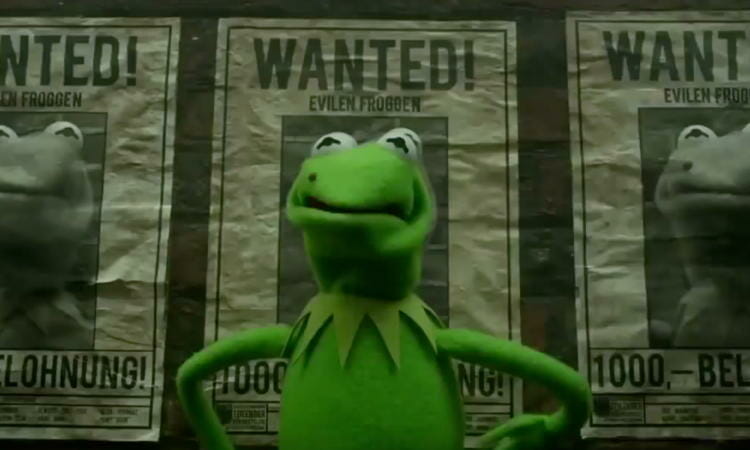By Jim Rohner · March 23, 2014

Immediately after finding their careers revitalized as depicted in The Muppets, Kermit the Frog and friends have a very important question to answer: how do they capitalize on their new found fame?
The motley Muppet crew have a menagerie of ideas for next steps and new acts, but the conservative Kermit finds himself flustered with making the next big step. Luckily for the Muppets talent manager Dominic Badguy (pronounced, "ba-gee") (Ricky Gervais), approaches Kermit and co. with a brilliant and ambitious idea – a world tour. Starting at the world famous Theatre of the West in Berlin, The Muppet Show World Tour seems destined to be a hit with an opening night sell out despite Kermit's apprehension that the disorganized act isn't ready for prime time yet.
Dominic's seemingly immediate dividends shifts the Muppets' loyalty from their green leader to the smarmy newcomer, shaking the confidence of the amphibian looking for the rainbow connection and sending him off on an isolated walk into the back streets of Berlin searching for some hope. What he finds instead in the cobblestone streets of the neighborhood of Plotpointburgen is the first step of an evil scheme to usurp the Muppets for dastardly deeds. It's there that Kermit runs into Constantine, dubbed "the world's most dangerous frog" and the #1 most wanted criminal after his escape from a Russian gulag. A dead ringer for the one who finds it difficult being green (with the exception of the trademarked dastardly mole), Constantine swaps places with Kermit, taking over control of the Muppets while everyone's favorite frog gets mistakenly sent back to frigid Serbia.
Reunited with Dominic, who's frequently reminded of his #2 status, Constantine takes the tour across the globe to theaters conveniently located near museums and banks boasting some of the world's most valued treasures. With Kermit gone, the Muppets devolve into disorganized chaos, but with no one believing Walter's or Animal's suspicions that there's something wrong with the actual impostor, the shows get worse and worse while the real Kermit begins to believe his family has forgotten about him.
In 2011 The Muppets surprised a lot of people, introducing new fans to the signature magic of The Muppets while also reminding old fans of what childlike wonder and giddiness used to feel like. That combination of discovery and nostalgia proved a potent concoction, aided by the fact that the script was written by Jason Segel, a lifelong Muppets fan, and featured Segel and new Muppet, Walter, as audience surrogates to help acclimate both new and old fans into an environment that had to be physically and emotionally reassembled. If The Muppets was getting back up on the bike, then Muppets Most Wanted is removing the training wheels and frankly, the trip is a little wobbly.
On the surface, everything that makes a Muppet movie good is there – you've got songs, celebrity cameos, pop culture self-awareness, humor that works on both juvenile and adult levels and, most importantly, all the Muppets we've come to know and love across the decades (even Rizzo and Robin the Frog make appearances). James Dobin returns to the director's chair, Nicholas Stoller reprises as co-writer (teaming with Dobin) and Oscar winner Bret McKenzie once again turns in oodles of original songs, but for some reason, all of it feels just a little off, like there's some intangible force that made The Muppets cohesive but has somehow been forgotten or lost in the 2 and a half years since its premiere.
Perhaps it's the absence of Segel, not just as a writer with an inherent passion and comedic timing, but also as a character whose journey was equally emotionally valid yet separate from that of Kermit and crew that makes Muppets Most Wanted seem lacking. The film's focus on Kermit's arrest and isolation provide the film with an emotional anchor, but switching back to the rest of the Muppets finds no subplot to match it in emotion or balance it with comedy. The exploits of Gary (Segel) and Mary (Amy Adams) made the plight of the Muppets personal and intimate in The Muppets, whereas the thrills and gags that result from the bank heist plotting of Dominic and Constantine never seem to feel as satisfying no matter how many celebrity cameos (Danny Trejo, Ray Liotta, James McAvoy, Toby Jones, Frank Langella, Tom Hiddleston, etc. etc. I've only scratched the surface) they try and squeeze in. Not helping matters is the fact that Muppets Most Wanted can't boast songs like "Life's a Happy Song" or a "Man or Muppet" that get stuck in your head for days on end.
And yet, despite these complaints, which admittedly seem like a lot both quantitatively and qualitatively, are only really going to matter to those who, like Segel, are the minority in their intense passion and enthusiasm for the institution of The Muppets. In the end, what the Muppets stand for and what they strive for – comedy, fun, heart, family and friends – are still very much apparent. The execution of Muppets Most Wanted might not meet the expectations of some, but it's not as though the filmmakers aren't trying. Some of the jokes may be lazy, but they're there; some of the heart may be a little ham-fisted, but it's there; and some of the songs may not be as memorable, but they're there. No matter how many times Ty Burrell makes a joke about how lazy Europeans are, everything that we've come to know and love about the Muppets is still up on screen and presented with sincerity and without cynicism. Those of us with decades worth of exposure to The Muppets may have come to expect better, but for those whose first exposure to addiction was The Muppets in 2011, there's now a Great Muppet Caper for a new generation.